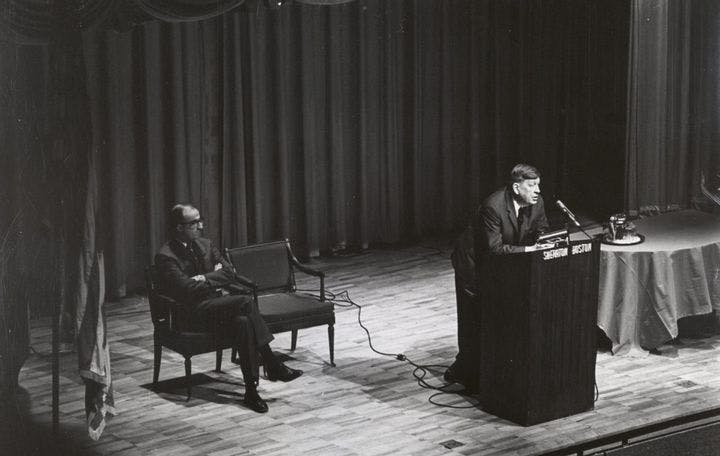Winter 2011
Transatlantic Poet
– Troy Jollimore
W. H. Auden adopted America as his own, and it adopted him.
By the time of his death in 1973, at age 66, the poet Wystan Hugh Auden had been an American citizen for almost three decades. Born in Britain in 1907, the onetime schoolteacher was already well on his way to establishing himself as one of the 20th century’s leading poets when in 1939 he emigrated to the United States. It is not surprising, then, that at his passing it was American poets who felt most keenly that they had lost a master craftsman and an elder statesman. He had adopted their country as his own, and it had adopted him.
Auden’s poems—including such famous lyrics as “September 1, 1939” and “In Memory of W. B. Yeats”—combined elements of the traditional with Modernist innovations; the result was a voice that could move rapidly between a public declamatory tone and one that was markedly personal and intimate. In The Age of Auden, University of Georgia English professor Aidan Wasley explores the ways in which Auden’s work shaped that of young American writers who read and, in many cases, knew him. During his lifetime, Wasley writes, Auden influenced “a startlingly diverse range of poets whose work would go on to define what we talk about when we talk about contemporary American poetry.”
The American edition of a book Auden published in 1941, two years after his arrival in America, was titled The Double Man, and Wasley emphasizes the various senses in which the poet’s life, career, and even character were bifurcated as he reinvented himself after crossing the Atlantic. “Auden’s renunciation of his English poetic identity amounted to a wholesale redefinition of poetry’s power and place in the world,” Wasley writes. Interestingly, the American poets Auden inspired often identified more with the youthful radicalism of his earlier work than with the apolitical, conservative values he seemed to adopt later in life. Wasley is clearly aware of this fact, though he does not explore it in The Age of Auden to the extent some readers might wish.
Wasley pays particular attention to Auden’s influence on James Merrill, John Ashbery, and Adrienne Rich. (Auden selected both Ashbery’s and Rich’s first major collections for the renowned Yale Series of Younger Poets.) For Merrill and Rich—who had complicated relationships with their own fathers—Auden functioned as a poetic father figure. Merrill’s most important work, The Changing Light at Sandover (1982), begins “in the shadow of Auden’s death and ends with Auden’s shadow itself instructing Merrill in the relationship between his own living poetic voice and those of his dead precursors,” Wasley writes. Rich saw in Auden a powerful male authority whom she desired both to please and to resist. As her work matured, Wasley says, “Rich would achieve, on her own terms, the ‘radical change and significant novelty in artistic style’ that Auden had found lacking in her first book.” Wasley resists the dominant view that Ashbery’s main influence has been Wallace Stevens, arguing—as Ashbery himself has occasionally suggested—that Auden was at least as important, particularly early in Ashbery’s career.
“In Memory of W. B. Yeats”—the first poem Auden wrote after arriving in the United States—contains his famous statement that “poetry makes nothing happen.” Wasley returns repeatedly to that phrase, attempting to dispel the idea that Auden meant to express deep pessimism about poetry or skepticism about its power to influence politics and society. A few lines later, Auden wrote that poetry “survives, / A way of happening, a mouth,” and Wasley takes this as an indication that Auden hoped poetry might reflect “the world not by standing outside it and looking in, but by taking a fundamental, engaged place within it.”
I confess to finding such formulations a bit vague. Of Wasley’s main contention—that Auden, for all his Britishness, has exerted a powerful influence on American poetry—there can be no doubt, but it is not a new idea. The book is strongest when it focuses on particular poems, not only those by Ashbery, Merrill, and Rich, but also James Schuyler, Frank O’Hara, and William Meredith. There is an undeniable pleasure in seeing connections drawn between such disparate writers, especially when these lines converge in a figure as compelling and multifaceted as Auden, and when the delight Wasley himself takes in the poetry of Auden and those he inspired is evident on nearly every page.
* * *
Troy Jollimore, an associate professor of philosophy at California State University, Chico, is the author of Tom Thomson in Purgatory, which won the 2006 National Book Critics Circle Award for poetry. His second book, At Lake Scugog, is forthcoming in the Princeton Series of Contemporary Poets later this year.
Reviewed: "The Age of Auden: Postwar Poetry and the American Scene" by Aidan Wasley, Princeton University Press, 2010.
Photo courtesy of Burns Library, Boston College
